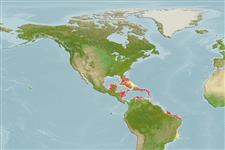Demospongiae |
Clionaida |
Spirastrellidae
Environment: milieu / climate zone / djupintervall / distribution range
Ekologi
; brackvatten; djupintervall 0 - 15 m (Ref. 415). Subtropical
Eastern Central Pacific and Western Atlantic.
Length at first maturity / Size / Weight / Age
Könsmognad: Lm ? range ? - ? cm
Thin encrusting: 0.1 - 0.5 cm bright red sponge. Internally the color grades from red to brown or orange. Smooth surface, leathery to the touch. Small oscules: 0.05 - 0.2 cm in diameter often on small mounds, with star shaped transparent canals departing from the oscula (Ref. 415).
Minimum depth from Ref. 108813. Rare species in between coral rubble, usually cryptic; 1 to 15 m deep (Ref. 415). Also occurs in mangrove ponds (Ref. 86789). In Belize, it was found in a submarine cave near Columbus Cay (Ref. 87209).
Life cycle and mating behavior
Könsmognad | Reproduktion | Lek | Eggs | Fecundity | Larvae
Members of the class Demospongiae are hermaphroditic. Life cycle: The zygote develops into parenchymella larva (free-swimming) before settling down on a substrate where it grows into a young sponge.
Collin, R., M.C. Díaz, J. Norenburg, R.M. Rocha, J.A. Sánchez, M. Schulze, A. Schwartz and A. Valdés 2005 Photographic identification guide to some common marine invertebrates of Bocas Del Toro, Panama. Caribbean Journal of Science. 41(3):638-707. (Ref. 415)
IUCN Red List Status
(Ref. 130435: Version 2025-1)
CITES status (Ref. 108899)
Not Evaluated
Not Evaluated
Threat to humans
Human uses
| FishSource |
Verktyg
Ytterligare information
Trophic EcologyFood items (preys)FödosammansättningFödointagPredatorer Population dynamicsTillväxt
Max. ages / sizes
Length-weight rel.
Length-length rel.
Length-frequencies
Mass conversion
Abundans
PhysiologySyreförbrukning
Human RelatedStamps, coins, misc.
Internet-källor
Estimates based on models
Preferred temperature
(Ref.
115969): 23.5 - 28.3, mean 27.2 (based on 410 cells).
Price category
Unknown.
